On the 50th anniversary of the Sexual Offences Act, a timeline of 2,000 years of gay rights history
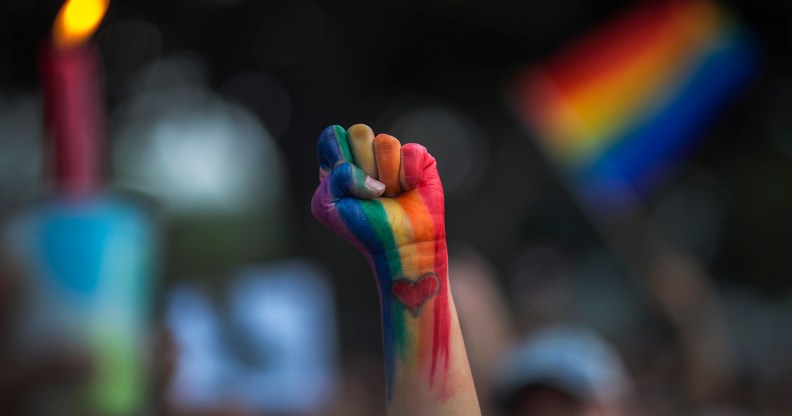
On July 27, 1967, Parliament passed the Sexual Offences Act, a significant step in the process of decriminalising homosexuality.
The law allowed homosexual sex, but only in private between two men aged over 21, and it only applied to England and Wales.
50 years later a lot of progress has been made, but there is still a vast way to go in the movement of LGBT+ rights.
On the anniversary of this milestone, PinkNews looks back at two thousand years of gay rights in the UK.
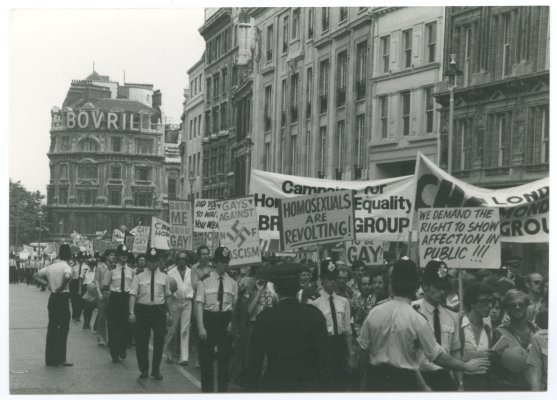
1974 London Pride March (photo from LSE)
43 – The Roman conquest of Britain brought with it the law Lex Scantinia which could be used to prosecute man having homosexual sex
390 – A Roman imperial decree gave the penalty of death by burning to “all persons who have the shameful custom of condemning a man’s body”
1102 – The Roman Catholic church council of the church in England made it clear that sodomy was among the sins that should be confessed
1327 – The deposed King Edward II of England was killed. There is some belief that he had a homosexual relationship Piers Gaveston, the Earl of Cornwall, though the story that he was killed by having a red-hot poker thrust into his anus is believed to be untrue
1533 – King Henry VIII passed the Buggery Act 1533 making all male-male sexual activity punishable by death. Buggery at this time referred to anal sex between anyone (regardless of gender), or bestiality
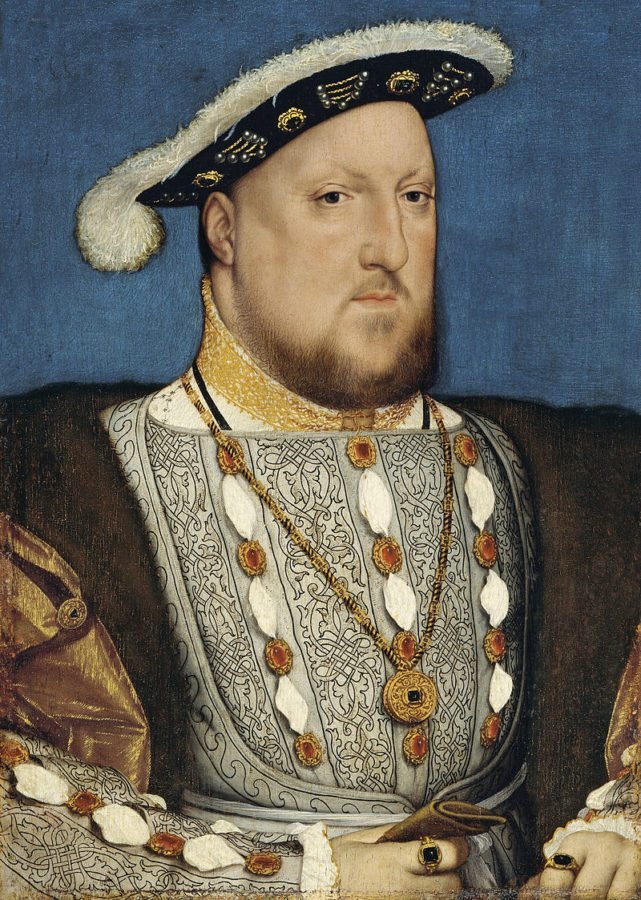
Henry VIII (wikicommons)
1543 – Henry VIII extended the Buggery Act to Wales
1606-1613 – King James I of England had a romantic relationship with Robert Carr and made him the 1st Earl of Somerset
1614-1625 – King James I of England had a romantic relationship with George Villiers, and gave him multiple titles including 1st Duke of Buckingham
1680 – Arabella Hunt married “James Howard,” who was actually a woman called Amy Poulter. Their marriage was annulled when they were discovered in 1682
1724-1726 – Margaret ‘Mother” Clap ran a popular Molly House for the underground gay community in Holborn, London. In a police raid on the house in 1726, 40 men were arrested and three were executed. Mother Clap was sentenced to the pillory and two years imprisoned, and it is not known what happened to her after, or even if she survived
1772 – The first public debate about homosexuality began during the trial of Captain Robert Jones who was convicted of the capital offence of sodomising a thirteen-year-old boy. Jones was pardoned on condition that he left the country
1810 – The Bow Street Runners raided The White Swan pub near Drury Lane and arrested 27 men on suspicion of sodomy
1828 – The Buggery Act was replaced by the Offences against the Person Act 1828, though buggery remained punishable by death
1835 – The last two men were executed in Britain for buggery, James Pratt and John Smith
1861 – The death penalty for buggery was abolished. Since 1806 almost 9000 men had been prosecuted for sodomy, 404 sentenced to death and 56 executed
1866 – The case of polygamy in Hyde v. Hyde and Woodmansee defined marriage as being between “one man and one woman,” which would later be used to prevent same-sex marriages
1885 – The British Parliament enacted the Labouchere Amendment which prohibited “gross indecency” between men, criminalising any sexual activity between men. Oscar Wilde and Alan Turing would famously be convicted under this amendment
1889 – A gay brothel was raided by police in what became known as the Cleveland Street Scandal. A number of aristocrats including Lord Arthur Somerset, Prince Albert Victor and Lord Euston, were implicated
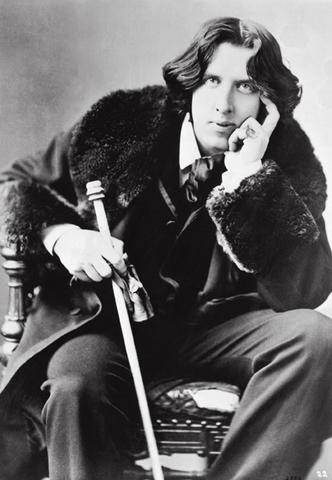
Oscar Wilde (wikicommons)
1895 – At the height of his fame, the writer Oscar Wilde was convicted of gross indecency with Lord Alfred Douglas and sentenced to two years hard labour. Upon release he immediately left the country and died destitute in Paris in 1900
1897 – British sexologist Havelock Ellis published a book in which he argues that homosexuality is not a disease but a natural anomaly, and should be accepted. The book was banned in England for being obscene
1897 – George Cecil Ives organised the Order of Chaeronea, a secret homosexual rights group – the first in England.
1906 – Dr. Louisa Martindale becomes the first woman GP. She wrote openly of her love for her female partner, Ismay FitzGerald, in her book, which was published in 1951
1912 – London’s first gay pub, The Cave of the Golden Calf, opened just off Regent Street
1913 – The British Society for the Study of Sex Psychology was founded, with Edward Carpenter as president. They aimed to combat legal discrimination against homosexuality with scientific understanding
1921 – The Criminal Law Amendment Act attempted to make sexual “acts of gross indecency” between women illegal, but never passed through the House of Lords. They believed that making lesbian sex illegal would “bring it to the notice of women who have never heard of it, never thought of it, never dreamed of it”
1928 – The lesbian novel The Well of Loneliness by Radclyffe Hall was published, and brought the topic of homosexuality to public conversation. The Sunday Express ran a campaign against the book for its “obscenity”
1932 – Noël Coward, a playwright known for his “flamboyance” wrote ‘Mad About the Boy’, a song which dealt with the theme of homosexual love. It had to be sung by a woman due to its risque nature.
1936 – Mark Weston, a 30-year-old British athletic champion, transitioned from female to male. It was reported in the news with more sensitivity than much transgender reporting today
1945 – When operating on injured WW2 soldiers, penis reconstructive surgery was developed, procedure now offered to transgender men

Alan Turing (wikicommons)
1952 – The commissioner of Scotland Yard began to weed out homosexuals from the British Government. During the early 1950s, there was widespread police clampdown on homosexual offences. Undercover police would pose as gay men, creating an atmosphere of extreme paranoia
1954 – Alan Turing, a computer scientist who had been integral to the code-cracking that enabled Nazi defeat, was convicted of gross indecency. He chose a sentence of chemical castration rather than prison and died, likely of suicide, two years later
1956 – The Sexual Offences Act of 1956 recognised that sexual assault between women was a crime
1957 – The Wolfenden report, which advised the British Government that homosexuality should not be illegal, was published
1958 – The Homosexual Law Reform Society was founded and began a campaign to make homosexuality legal in the UK
1963 – The Minorities Research Group (MRG) the UK’s first lesbian social and political organisation, was founded
1967 – The Sexual Offences Act partially decriminalised homosexuality. It only extended to acts between two men over 21 years of age, in private, only in England and Wales
1969 – Campaign for Homosexual Equality (CHE) formed as the first British gay activist group
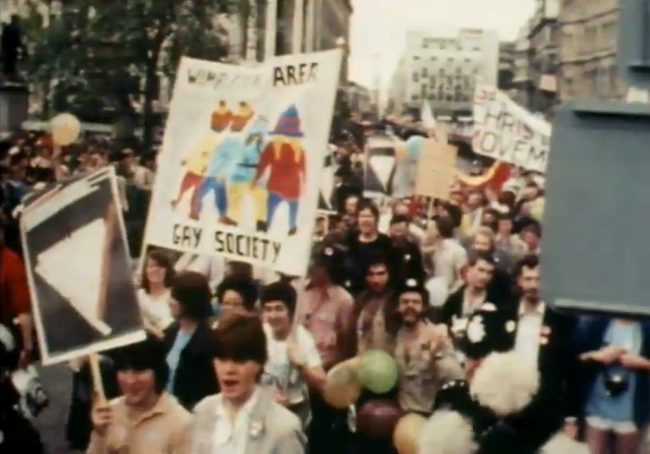
Convicted for Love (Channel 4)
1969 – The Stonewall Riots took place in New York, when LGBT+ people responded with violence against a police raid of the Stonewall Inn. This event was a defining moment in the LGBT+ rights movement in the United States and had a global ripple effect
1970 – Gay Liberation Front (GLF) was established at London School of Economics
1970 – A marriage between April Ashley and Arthur Cameron Corbett was annulled on the basis that April was a transgender woman – legally a man under British law. This set a precedent for trans people’s legal status
1971 – The Nullity of Marriage Act was passed, explicitly banning same-sex marriages between same-sex couples in England and Wales
1972 – The First British Gay Pride Rally was held in London with 1000 people marching from Trafalgar Square to Hyde Park
1977 – The first gay lesbian Trades Union Congress (TUC) conference took place to discuss workplace rights for Gays and Lesbians
1980 – The Criminal Justice (Scotland) Act 1980 decriminalized homosexual acts between two men over 21 years of age “in private” in Scotland
1980 – The first Black Gay and Lesbian Group was formed in the UK
1981 – The first UK case of AIDS was recorded when a 49-year-old man was admitted to Brompton Hospital in London, and died ten days later
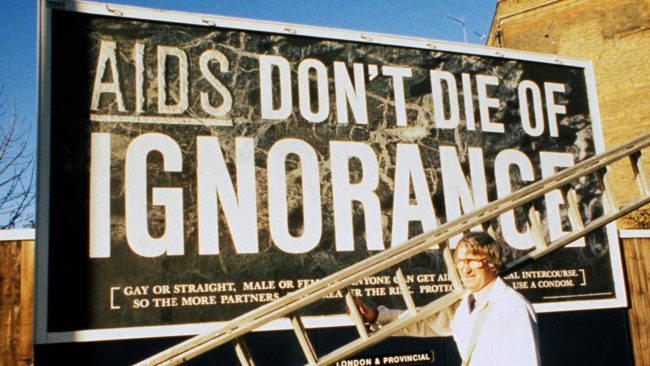
The shocking ad campaign run by the UK government in 1986 (wikicommons)
1982 – The Homosexual Offences (Northern Ireland) Order 1982 decriminalised homosexual acts between two men over 21 years of age “in private” in Northern Ireland
1983 – As AIDS cases become more common, gay men are asked not to donate blood
Related: In 2017, Government relaxes rules on gay blood donations
1984 – Chris Smith, newly elected Labour MP for Islington South and Finsbury, became the first openly out homosexual politician in the UK Parliament
1984 – The number of cases of AIDS reached 100
1985 – As AIDS hysteria grew, Health Minister, Kenneth Clarke, enacted powers to detain people with AIDS in hospital against their will
 1988 – Section 28 was introduced by Margaret Thatcher. It prohibits the “promotion” of homosexuality by local authorities
1988 – Section 28 was introduced by Margaret Thatcher. It prohibits the “promotion” of homosexuality by local authorities
1989 – The campaign group Stonewall UK was set up to oppose Section 28 and other barriers to equality
1990 – After a series of murders hundreds of lesbians and gay men marched to Ealing town hall and held a candlelit vigil. OutRage formed, to demand that police start protecting gay men instead of arresting them
1991 – Queen singer Freddie Mercury announced that he had AIDS, and died the following day.
1994 – The gay male age of consent was lowered to 18, though still not equal to the heterosexual age of 16. The lesbian age of consent was not set
1997 – Angela Eagle, Labour MP for Wallasey, becomes the first MP to come out voluntarily as a lesbian
1997 – Gay partners were given equal immigration rights
1998 – The Bolton 7, a group of gay and bisexual men were convicted of gross indecency under the Sexual Offences Act 1956, despite homosexuality’s 30-year partial decriminalisation. Three of the men were put on the Sex Offenders Register

The Admiral Duncan (wikicommons)
1999 – The Admiral Duncan, a gay pub in Soho, was bombed by former British National Party member David Copeland, killing three people and wounding at least 70
2000 – Homosexuals were no longer barred from serving in the British Army
2001 – The age of consent was equalised at 16 for all. Consensual group sex for gay men is also decriminalised
2002 – Same-sex couples were granted equal rights to adopt
2003 – Section 28 was repealed
2003 – Employment Equality Regulations made it illegal to discriminate against lesbians, gays or bisexuals at work
2004 – The Civil Partnership Act 2004, gave same-sex couples the same rights and responsibilities as married heterosexual couples. It had first been introduced as a private members bill by Lord Lester in 2002.
2004 – The Gender Recognition Act 2004 was passed, allowing transgender to change their birth certificate and get legal recognition of their sex-change
2006 – The Equality Act 2006 made it illegal to discriminate against lesbian and gay customers
2008 – Treatment of lesbian parents and their children was equalised in the Human Fertilisation and Embryology Act 2008
2008 – Parliament created a new offence of incitement to homophobic hatred
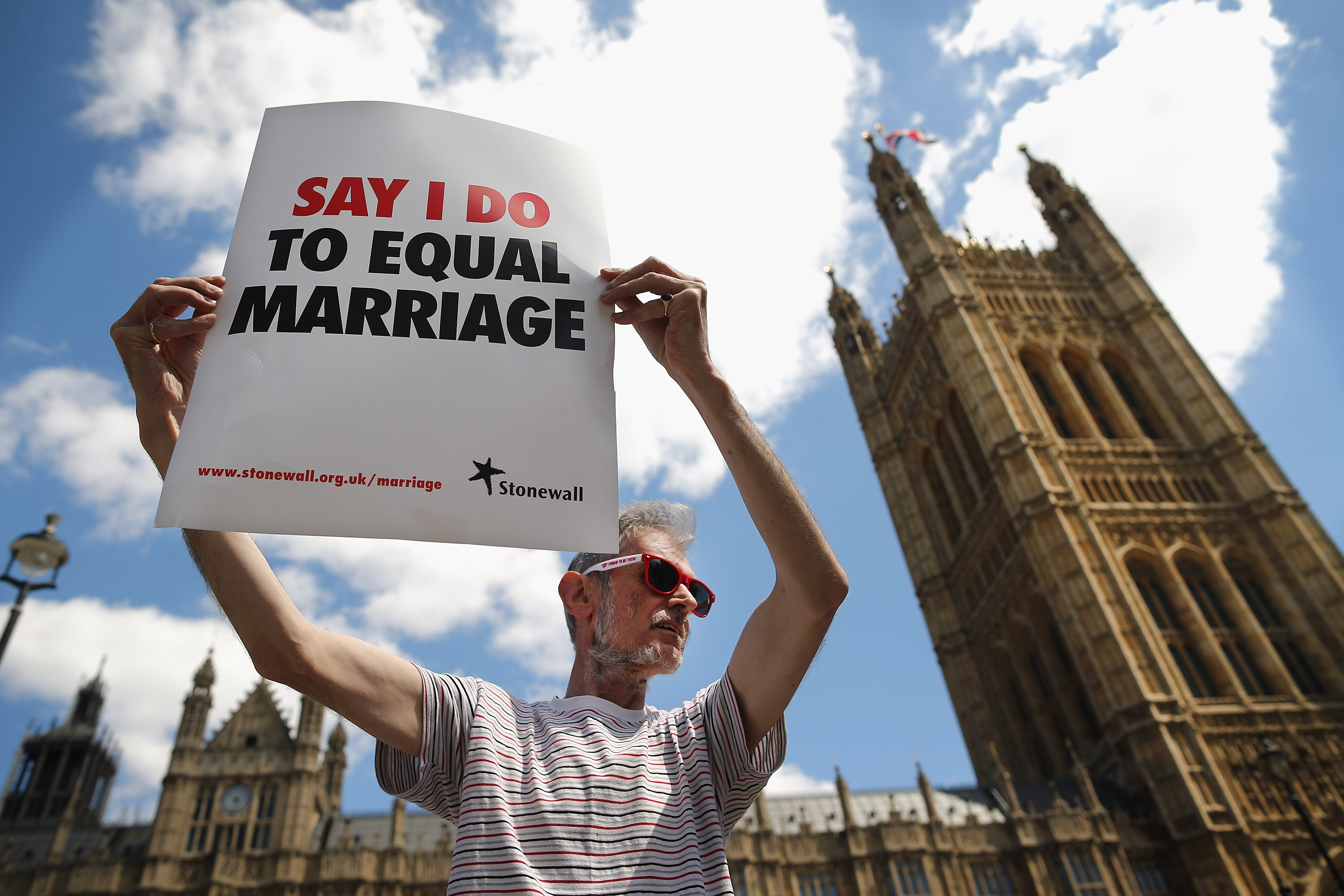
(Stonewall)
2009 – Prime Minister Gordon Brown makes a posthumous apology to Alan Turing. Leader of the Conservative Party David Cameron apologises for Section 28
2010 – In the run up to the 2010 General Election, PinkNews pushed the campaign for equal marriage, questioning party leaders, Nick Clegg, David Cameron and Gordon Brown, on their views to ensure LGBT issues were on the political agenda
2010 – The Supreme Court ruled that two gay men from Iran and Cameroon have the right to asylum in the UK, saying “to compel a homosexual person to pretend that his sexuality does not exist or suppress the behaviour by which to manifest itself is to deny him the fundamental right to be who he is”
2011 – David Cameron promised that same-sex marriage would be legalised before the next General Election
2012 – PinkNews launched their Out4Marriage campaign. Liberal Democrat MP Lynne Featherstone became the first politician to take part, launching the government consultation into same-sex marriage
2014 – Same-sex marriage became legal in England and Wales and Scotland
2017 – Under the Turing Law, the UK government issued a pardon for men convicted of having sex with other men

